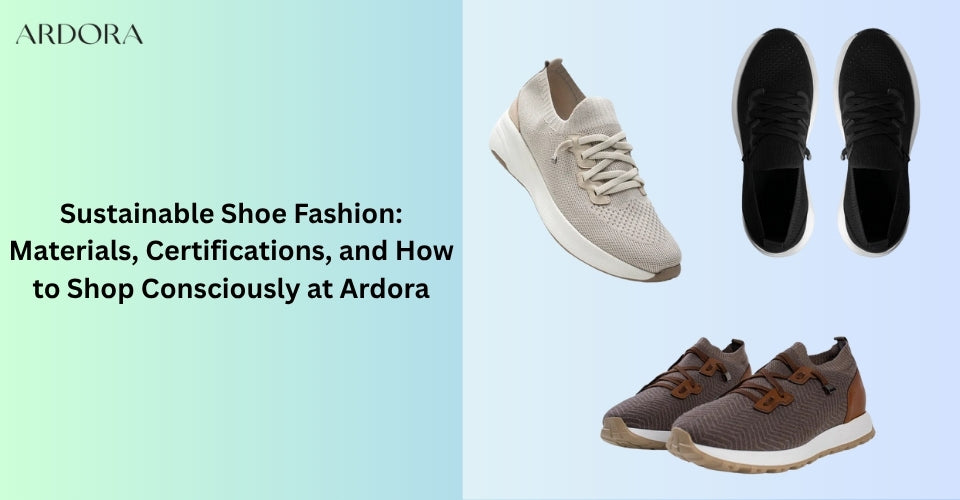
Sustainable Shoe Fashion: Materials, Certifications, and How to Shop Consciously at Ardora
The footwear industry is undergoing a profound transformation. Consumers now demand more than style and comfort; they seek sustainability, ethical sourcing, and full transparency throughout every stage of production. At Ardora Boutique, we understand this shift—and have built our brand around these core principles.
In this article, we explore the materials and certifications that define truly responsible shoe fashion, reveal how to distinguish greenwashing from genuine eco‑innovation, and offer a roadmap for shopping consciously at Ardora Boutique without compromising on aesthetic appeal or performance.
Why Sustainability Matters in Footwear

As millions of shoes are manufactured each year, the environmental footprint grows—from resource extraction to chemical‑intensive tanning processes. Traditional leather production consumes vast amounts of water and generates hazardous waste, while synthetic materials often derive from fossil fuels and fail to biodegrade. Embracing sustainability in shoe design means prioritizing renewable resources, reducing carbon emissions, and minimizing landfill contributions. By choosing eco‑friendly alternatives, consumers can drive industry‑wide change, encouraging brands to adopt circular‑economy models and responsibly manage materials from cradle to cradle.
Key Eco‑Friendly Materials
Modern sustainable shoemaking relies on innovative fabrics and leathers that match or exceed the durability and comfort of conventional options. When evaluating a pair of shoes, look for:
- Recycled Polyester and Nylon Obtained from post‑consumer plastics or fishing nets, these fibers divert waste from oceans and landfills. They retain strength and flexibility while reducing reliance on virgin petrochemicals.
- Plant‑Based Leathers Materials such as Piñatex (derived from pineapple leaf fibers) or cactus leather offer cruelty‑free alternatives with minimal water usage. Their natural textures evolve with wear, much like traditional hide.
- Organic Cotton and Hemp Cultivated without synthetic pesticides or fertilizers, these fibers decompose naturally and require less irrigation than conventional cotton. When woven into canvas or lining, they increase breathability and decrease chemical exposure.
- Natural Rubber and Cork Harvested from rubber trees using sustainable tapping methods, natural rubber yields flexible, biodegradable soles. Cork—harvested without tree felling—provides lightweight cushioning and moisture resistance.
By incorporating these materials, brands can achieve ethical sourcing standards that respect both people and the planet.
Certifications That Guarantee Integrity
Given the proliferation of eco‑claims, third‑party certifications are essential to verify authenticity. Key labels to watch for include:
● Global Organic Textile Standard (GOTS) Ensures organic fiber content, environmentally and socially responsible manufacturing, and safe chemical use.
● Leather Working Group (LWG) Rates tanneries on water use, waste management, energy consumption, and chemical stewardship.
● OEKO‑TEX® Standard 100 Screens for harmful substances in textile and leather goods, safeguarding wearer health.
● Forest Stewardship Council (FSC) Verifies responsible sourcing of wood‑derived materials such as cork.
When a shoe carries these credentials, shoppers gain confidence in material provenance and production ethics—foundations of true transparency.
How to Identify Genuine Responsible Brands
Beyond certifications, conscientious consumers should investigate a brand’s overall approach:
- Supply‑Chain Visibility Leading labels publish detailed maps of their suppliers and production facilities. This openness fosters accountability and spotlights best‑practice workshops.
- Environmental Impact Reporting Annual sustainability reports outline carbon footprints, water usage metrics, and waste‑reduction goals. Brands that measure and disclose progress demonstrate real commitment.
- Fair‑Labor Practices Ethical sourcing extends to worker welfare. Verify that a company adheres to living‑wage standards, safe working conditions, and freedom of association.
- Circular Initiatives Look for take‑back programs, repair services, and resale platforms that extend product lifespans and divert items from landfills.
By applying these criteria, shoppers can cut through greenwashing and support companies that fully embrace ethical footwear production.
Conscious Shopping at Ardora Boutique
At Ardora Boutique, we weave sustainability, ethical sourcing, and transparency into every design. Here’s how to shop wisely with us:
1. Explore the Eco Collection
Our dedicated Eco Collection features shoes crafted from recycled, plant‑based, and certified materials. Each product page lists material composition, environmental certifications, and origin stories for primary components—empowering you to make informed choices.
2. Check the Transparency Dashboard
We maintain a live Transparency Dashboard on our website that traces every pair’s journey—from raw material harvest to final assembly. Interactive maps and supplier profiles allow you to deep‑dive into factory locations, production methods, and community initiatives.
3. Utilize the “Sustainability Filter”
When browsing, activate the Sustainability Filter to view only footwear meeting our stringent eco‑standards. Filter options include carbon‑neutral shipping, vegan materials, and certified organic textiles—streamlining the decision‑making process.
4. Opt for Repair and Recycle Services
Extend the life of your favorites through our repair program. Minor scuffs, sole wear, and loose stitching are handled by expert cobblers, often at no additional charge. When retirement finally arrives, send worn shoes back for responsible recycling—closing the loop on resource use.
5. Engage with Our Community Forums
Join our online forums to exchange styling tips, care advice, and sustainability challenges with fellow shoppers. Our in‑house experts moderate discussions, share behind‑the‑scenes videos, and host live Q&A sessions on material innovations and certification processes.
Balancing Style, Comfort, and Conscience
A frequent misconception is that eco‑friendly shoes sacrifice design or performance. In reality, advances in material science deliver products that are both chic and resilient:
● Ergonomic Design Contoured insoles made from natural latex and cork respond to foot anatomy, reducing fatigue during all‑day wear.
● Breathable Linings Organic cotton and hemp blends wick moisture effectively, preventing odor and enhancing comfort in warm conditions.
● Timeless Silhouettes Minimalist aesthetics paired with versatile colorways ensure longevity in both fashion and practicality—discouraging fast‑fashion disposal cycles.
When you invest in well‑crafted styles, you embrace footwear that transcends seasonality and minimizes environmental impact.
The Future of Ethical Footwear
Looking ahead, the industry is poised for further breakthroughs:
● Bio‑Based Polymers Research into mushroom‑derived mycelium leathers and algae‑based foams promises to reduce dependence on petrochemical inputs.
● Blockchain Traceability Distributed ledgers will enable immutable tracking of each component, from field to factory floor—bolstering transparency and consumer trust.
● 3D‑Printed Customization On‑demand manufacturing reduces waste by producing shoes tailored precisely to individual foot dimensions, eliminating overproduction.
By staying abreast of these trends, responsible brands can continue to elevate sustainability benchmarks and expand the scope of ethical sourcing across their entire operations.
Cultivating a conscientious wardrobe involves more than swapping one pair of shoes for another—it requires a commitment to understanding the journey each product takes from raw materials to your feet. Through responsible material selection, robust certifications, and open communication, Ardora Boutique empowers shoppers to embrace footwear that aligns with their values. Whether you’re exploring plant‑based leathers, recycled fabrics, or certified organic textiles, the path to sustainable style is clear. Shop consciously, demand transparency, and celebrate the fact that each step you take in an Ardora pair supports a healthier planet and fairer industry for all.



